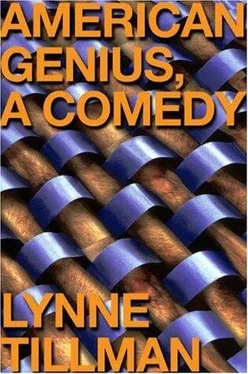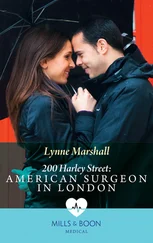Rattled, though wanting to live a life I might imagine, but haven't yet, and to escape myself, in seconds I throw on my thick, all-cotton black trousers and a real red cashmere cardigan sweater, and, with what I believe to be a determined air, quit the sleeping room to engage society again until I may return to this room and sleep unimpinged by its demands. There are loose ends, my mother loses a stitch and picks it up, I lose the will to resolve a problem, then pick it up the next day. Before dinner, when a productive or nonproductive day is nearly done, I can have a drink, often a Campari and soda, for my nervous stomach, my second heart, and read the newspaper, since I remain attached to the world and remote events, which may or may not have significance or consequence to me, like the relationship of the tall balding man and the disconsolate woman, anorectic and psoriatic, and others I notice, who should have no real interest for me, and, still, because I'm discontent or in need of distraction from worse contemplations, I pay a subversive's attention. There is a half hour before dinner, and the main room or lounge is almost empty of people, few residents have arrived, they include the dour man and fretful woman, with whom I have no relationship, or enmity, and to whom I nod and walk past, addressing myself only to the mail room at the side of the main hall. It is larger than a spacious walk-in closet, and once inside this simple enclosure, I have minutes alone to experience hope or disappointment, since mail or no mail is a daily fate. In the wooden slot, with "Helen" marked on it, there is a square, kelly green envelope and a postcard. I open the envelope, invariably it's envelopes first, the envelope's pale green letter contains a one-line question: "Where Were You When It Happened?" The alarming words were printed by a person with sloppy penmanship, which is common, since a neat hand no longer matters and few write by hand, as I don't. My mother learned a perfect script, but now when she writes, her hand trembles and her words are written by a spider. My father crossed out or wrote over individual letters, to make them clearer, rendering them less readable, but drawing and making graphic the insecurity he felt, and I have often felt, when my mother's handwriting never showed doubt, that it should have, because she killed the cat who loved her more than anyone, to protect me, she explained when I was nine, because the cat had killed my parakeet. I didn't care about my parakeet, and it was soon after my brother left home, before my dog was given to me for Christmas, who was also killed by my parents but for whose sad demise I accept blame. "Where Were You When It Happened?" I read again, and in the closet-like space that smells of pine trees and Murphy's Oil, my skin clamors, my cheeks redden, my nose grows cold, and, quickly, I turn to the second piece of mail for relief from the first, and, as if I'd willed it, which occasionally happens, something I hope for turns up, so I can believe I've caused its appearance, people conjure anything to believe they are in control of their fates, there is a third postcard, this time of a church in Italy, its stamp Italian and franked ten days ago. Typed on its message side, three elliptical sentences: "We are thinking of buying a church. Would you come visit me? I promise you nothing, and everything, too." The familiar, indecipherable, birdlike signature at the bottom, the same as on the other two, might represent two people, or the royal we, so once more I am enmeshed in a serial drama, its welcome embrace, and, instantly, I decide not to think further about its significance but rather to nurse its inscrutable promise. With this third postcard, the series' provocative messages intimated possibility, I could anticipate more treasure as well as cherish the postcards already received from the sender or senders, and, with the third, since good things come in three, though I don't totally subscribe to this, I do usually think it, I may hope for a satisfactory coda.
Tonight, before dinner, I sit on the plump pillows of a two-seater brocade couch, on impact they make a whooshing sound like the couch in the living room in my family house that was sold against my protests, but I don't have to plump these pillows beneath me now. I reach for the newspaper, scan the headlines of the first section, read all the small items, a man has been indicted for the murder of his female lover, whom he met at a convention for devotees of the 1960s TV show Dark Shadows, then turn to the obituary notices and stock market prices, but in mind I tenderly carry and weigh the image of the scholarly Irishwoman, so when the tall balding man and the disconsolate woman enter, separately but close in time, their intimacy flies around the room with an angel's fragile wings. Now they stand by the fire, not far from me, close to each other, speaking in low tones, as the Count and Contesa emerge through separate, noisy doors. The Count will sit beside me soon enough, and the Turkish poet, who is often late to dinner, which disturbs the staff, especially the head cook, and also Contesa. Though I should resign myself to or accept change, since it's inevitable, and flexibility signifies health in body and mind, though someone who changes too easily is perceived as weak, I dread the arrival of new residents, who may present fresh obstacles, as well as some of the older residents, like the demanding man, who arrives with a sigh and a wave of his hand, so that all will notice him, though most don't. At dinner, he will inevitably grab a chair at any table that has one free. I avoid his company, but it is sometimes thrust on me like a cold. Meanwhile, I discreetly study the fragile couple and new residents who arrived in the afternoon, while I was walking into town, visiting the shop, buying a postcard for the Polish cosmetician, or seeing the kitchen helper and his two buddies, and my dry skin tingles. I sense beet red rouging my cheeks, it could be the heat of the fire, and many here are aware of how sensitive my skin is.
Without removing her dark glasses and floor-length black fur coat, worn to protect her from the cold, as she is old-school and confirmed in her habits, and, I believe, to annoy the environmentalists and vegetarians, Contesa crooks her index finger and points to a corner of the room, where photographs of local and national birds hang, entreating me into a conspiracy, and, hesitantly I rise, not just because I'm uncertain whether I can manage another conspiracy. I will instantly forfeit my comfortable seat to the dour man and the fretful woman, both shadow my movements and echo them, mimicking me in some way, and, as soon as I rise, with alacrity, they do replace me on the brocade couch. Mentally, I denounce them.
Contesa has planned an event for the evening, she tells me, ever mischievous, which will happen in the lecture hour after dinner, upstairs in the Rotunda Room above the main hall that has a small stage or raised platform, a reading of her first one-act play on whose creation she has labored in silence, since she wanted to surprise us, the Count and me especially. It's true I desire surprise, but my second heart rebels, my intestines twist slightly, and I blush again, for the play might reveal something I don't want to know or watch. Contesa has enlisted some of the residents, but she won't say whom, as well as others, to play the parts or read them. "You'll have it before your eyes soon enough," she teases, impishly lifting her dark glasses onto the top of her forehead, and her words echo someone else's, but I can't remember whose. We walk to the leather couches where we sit beside each other, while the new arrivals, a sallow, bearded man, who, I learn, is an obituary writer and professional magician, a gregarious, pretty woman, with smooth skin the color of eggplant, a poet and activist, named Rita, or "the saint of lost causes," she explains ironically, and a stout, florid man with a network of broken veins on his bulbous nose, a wine writer and art collector, make conversation with each other. They dot the area of the room near the big fire. Listening to their conversation with my eyes on the floor, I finish my Campari and soda, while Contesa draws out her gin and tonic. The magician has them engrossed in a story about a girl whose mother suddenly disappeared. The police listed the woman as a missing person, and after two years the case was closed. But every night the daughter dreamed her mother was locked up in a place and couldn't move. The nightmare was always the same, and the daughter began to suspect that her mother wasn't missing. One day she remembered that the freezer in the basement was locked, but it hadn't been before her mother's death. So she and her younger sister pried it open, found their mother's body, and went to the police station. Their father confessed to the murder. He had kept her body in the freezer for three years, he explained, because he didn't want to part with her. "Morbid," says Rita, the saint of lost causes. "I'm claustrophobic," says the Wineman. "But you know it gives me faith in people's dreams," says the Magician.
Читать дальше












